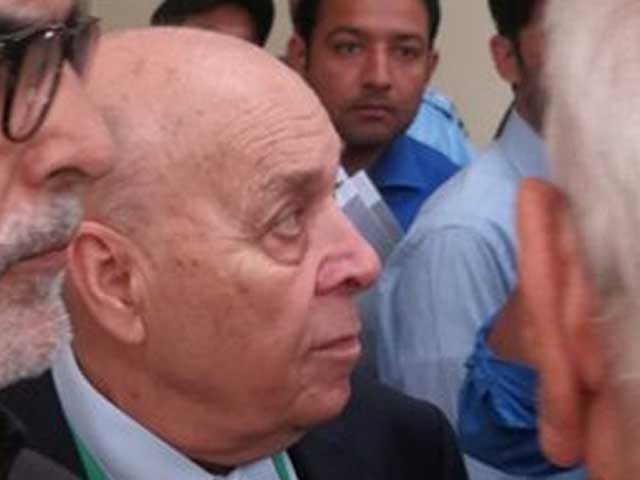Fake accounts case: Majeed, Lawai to be shifted to Malir jail
JIT counsel believes the move violates Supreme Court's directives

PHOTO: FILE
"Permission is hereby granted for accused prisoners namely Abdul Ghani Majeed and Hussain Lawai to remain confined in district jail Malir in Sindh till finalisation of the case before special judge (offences in banks) Karachi, Sindh, as per recommendation of home department, government of Sindh,” says a notification issued by the Punjab Home Department to the provincial inspector general of prisons.
Advocate Faisal Siddiqi, who represented the joint investigation team (JIT) before the Supreme Court in the case, believes that the move is a violation of the apex court’s orders in the fake accounts case and says it is beyond comprehension how and why the Punjab government has issued such a notification that may amount to contempt.
SHC inquires why Anwar Majeed, sons failed to file tax returns
The Supreme Court through the order dated November 17, 2018 had directed shifting of Majid and Lawai to be shifted to Adiyala Jail in Rawalpindi for interrogation by the JIT.
The order has neither been challenged by the two accused nor vacated or reviewed by the court.
In the final verdict issued on January 7, the Supreme Court noted in para 7, as well as in para 19, that both the individuals continued to be detained in Punjab and it was for this reason that it did not pass any fresh order for their detention outside Sindh.
A senior official says that the notification violates the letter and spirit of the Supreme Court order for two reasons. Firstly, the order dated November 17 has not been varied, rather has been mentioned in the final order. Secondly, one of the main purposes of their detention is their interrogation and investigation in the cases, which is pending in Rawalpindi.
Earlier, the Omni Group while challenging the verdict had also raised objections over the transfer of investigation from Karachi to Islamabad/Rawalpindi.
The fake accounts saga
In December 2015, the Federal Investigation Agency began a discreet investigation into certain bank accounts through which multi-billion rupee transactions have been made. According to FIA sources, information regarding the fake accounts came to the fore when an intelligence agency picked up a prominent money changer in an unrelated case.
As the monitoring and investigation of these suspicious accounts continued, it surfaced that five of these accounts in two banks – the Sindh Bank and Summit Bank – had been used for transactions worth around Rs15 billion.
Investigation showed the accounts were operated by fake companies. Funds were credited into these accounts from contractors with multi-billion rupee contracts with the Sindh government. The money was found to have been transferred to accounts of companies owned and operated by the Omni Group, whose chairperson, Anwar Majeed, is a close aide of Pakistan Peoples Party (PPP) co-chairperson Asif Ali Zardari. Another beneficiary was Nasir Lootah, the chairperson of Summit Bank.
The probe, however, was shelved. It resumed almost a year and a half later. FIA’s State Bank circle initiated a formal inquiry in January, 2018.
By June, the FIA had several high-profile names on its list but was unable to make headway – for several reasons. It was at his point that the Supreme Court intervened. Chief Justice Mian Saqib Nisar took suo motu notice of the ‘slow progress’ in the money laundering case.
In July, Zardari’s close aides; Hussain Lawai, Taha Raza and two others were arrested. Subsequently, the first case was registered in the mega-corruption scandal.
The FIA submitted its report to the apex court on July 8 which revealed a web of companies and accounts that were being used to transfer billions of rupees.
In all, 29 accounts were identified that received payments, totaling at least Rs35 billion.
In August, Omni Group chief Anwar Majeed was arrested along with son Abdul Ghani Majeed when they returned to the country on being summoned by the apex court. They are now on judicial remand.
Meanwhile, Asif Ali Zardari and Faryal Talpur have appeared before the investigators and have since secured interim bail from the Banking Court. The last hearing of the case was on December 21, when the duo got their fourth extension in the bail till January 7.
Amid complaints from the FIA and barbs flying in the Supreme Court, CJP Nisar ordered the formation of a Joint Investigation Team to quicken the pace of the investigation. One of FIA’s principal complaints was the lack of cooperation from the Sindh government.
The JIT report in a nutshell
According to the report, the JIT identified 11,500 bank accounts and 924 account holders at the start of their investigation.
Its experts generated 59 Suspected Transaction Reports (STR) and 24,500 Cash Transaction Reports. That means the transactions were flagged as suspicious.
Due to the high quantum of transactions, the JIT decided on a threshold of Rs10million “to track, follow and minutely investigate the flow of funds beyond the immediate counterparties and determine the source of funds and ultimate beneficiaries.”
It questioned 767 individuals, including Zardari and Talpur, while Bilawal submitted written responses.
It has since had the names of 147 individuals placed on the Provisional National Identification List, which would allow authorities to identify if those individuals try to enter or exit the country through an airport. After the report was submitted to the SC, the names of 172 individuals have been placed on the no-fly list by the interior ministry on the JIT’s request.
The investigations have focused on 32 accounts of 11 fake entities. The first account, belonging to M/S Lucky Enterprises, opened in January 2010 and remained active till January 2017. It was used for 13,809 transactions.
The investigation uncovered that the 11 sole proprietorship entities were registered in the names of low-level employees of the Omni Group, as well as random individuals including a deceased person. All the accounts were operated by Omni Group executives.
A thorough review of the JIT report shows that representatives of State Bank and Securities and Exchange Commission of Pakistan (SECP) played a vital role in the investigation and preparation of the final report and recommendations.
Read the full text of the JIT report here.



















COMMENTS
Comments are moderated and generally will be posted if they are on-topic and not abusive.
For more information, please see our Comments FAQ